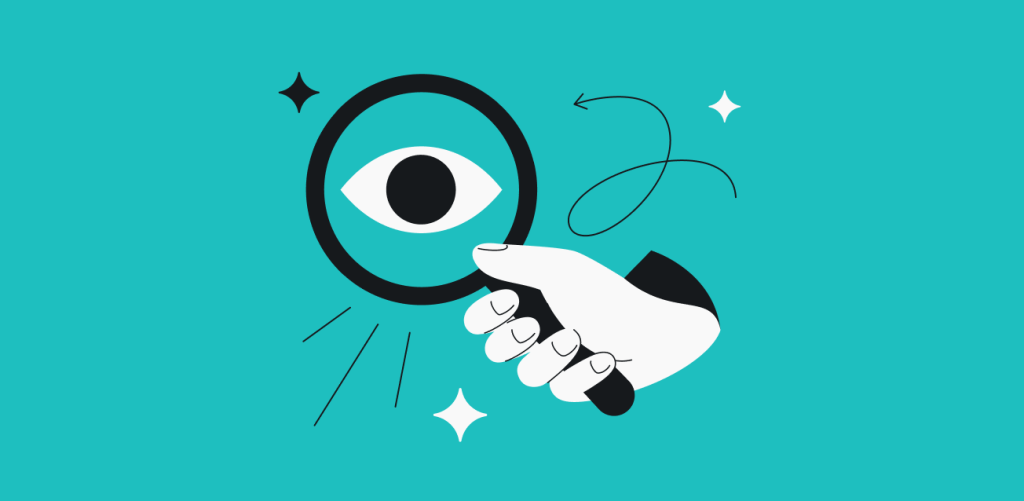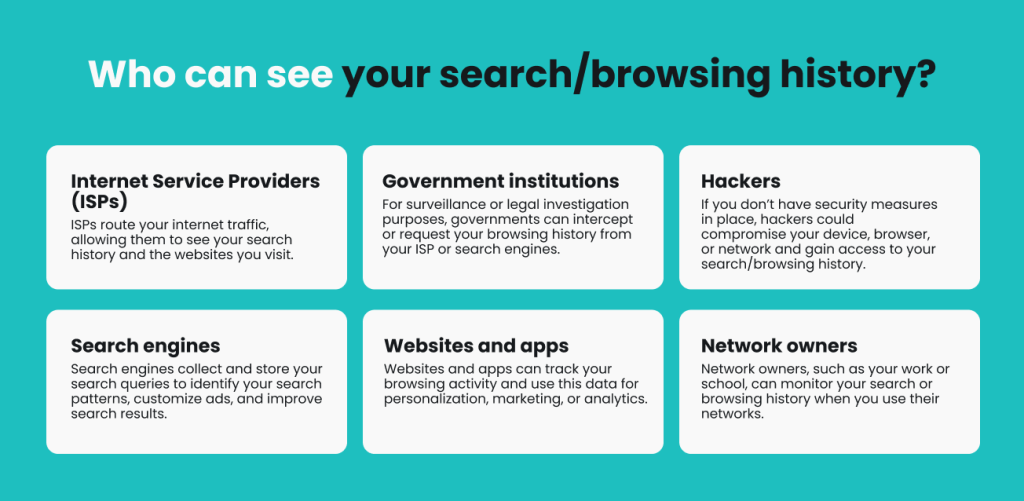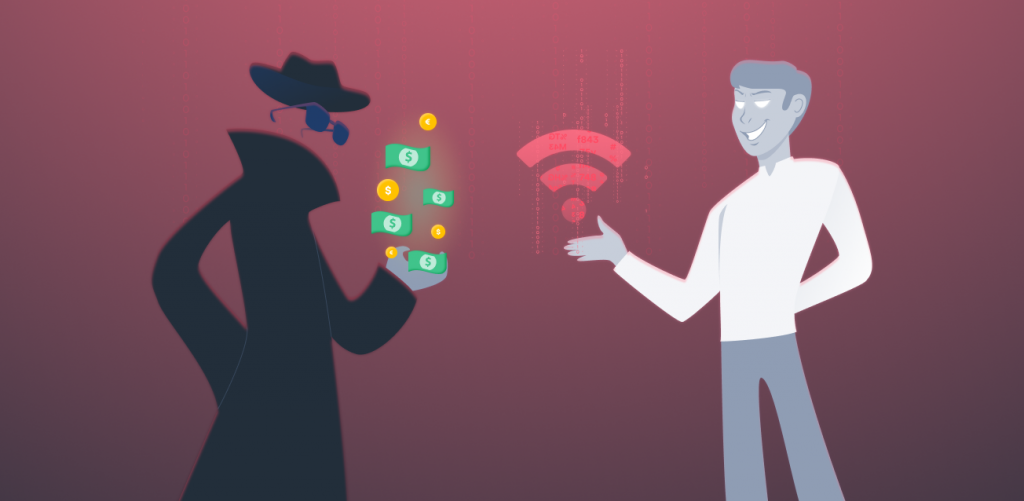
Yes, others can potentially see your search history, depending on your security tools and internet activity. Some examples of parties that might be able to see your searches include:
- Your ISP (Internet Service Provider);
- Network administrators;
- Websites and apps;
- Search engines;
- Hackers.
Table of contents

Who can see your browsing history?
Many would love to get their hands on your data. Here are a few that you should keep in mind:
-
Internet service providers
Everything you do online — all connection requests to websites or apps — goes through your ISP, meaning it can see your entire internet activity:
- Your current location;
- The devices you use;
- The content you watch;
- Websites you visit and how long you stay there;
- What you download;
- Exactly what you do on sites that use the outdated HTTP (Hypertext Transfer Protocol).
ISPs collect information about you for a variety of reasons:
- Complying with data retention laws — they track and provide data to the government for investigations, most often copyright violations;
- Imposing censorship — in restrictive countries like China, governments require ISPs to block access to sites that criticize the regime or oppose state religion;
- Bandwidth throttling — ISPs decrease the connection speed when accessing specific web pages or services to regulate their network traffic;
- Selling data to marketing companies — your web activity can be used to predict your online behavior and to personalize ads, so ISPs might monetize this data.
Can you request ISPs to provide the data collected from you?
Yes, but that would probably fail — ISPs deny requests to retrieve customers’ internet history because of extra labor which would increase costs. They also might not want you to know how much they know.
ISP tracking varies by provider and data retention laws. Some countries require providers to keep logs for six months, others up to a year. However, in most places, selling data to third parties is illegal (with exceptions like the US).
-
Government institutions
Do you ever wonder how much government/law enforcement agencies know about you? In most countries, they will need a court order or warrant to see your search or browsing data. But here’s some of the information that might be relevant to them:
- Your lifestyle — understanding your lifestyle and interests might help agencies identify odd behavior tendencies indicating illegal activity and security threats;
- Your search queries — your search history can help identify potential radicalization, criminal intent, and other illegal activities, which is crucial for preventing public safety threats;
- Your communication tools and online calls — monitoring your WhatsApp, Messenger, etc., can help detect suspicious conversations and prevent illegal schemes or cybercrime.
How could the government use your browsing history?
- Fighting crime — governments use internet browsing history to gather evidence, monitor suspicious activities and financial transactions, and build suspected criminals’ profiles;
- Repressing and influencing opinions — some governments may use browsing history to track down people or organizations who hold opposing views and opinions, their online activity, and curb political opposition/activism.
-
Hackers
Hackers can gain access to your browser history in various ways:
- Hacking into company databases — they could get login details for your accounts like Google, which stores your Google Chrome browsing history;
- Installing malware — cybercriminals have plenty of malicious files planted on the internet, and if any of them infect your devices, hackers may see your browsing history, among other information, such as login credentials, banking details, etc;
- Breaking into your network — being connected to the same network makes hacking into your devices and accessing data so much easier. This especially applies to public Wi-Fi;
- Exploiting security loopholes — outdated operating systems, weak passwords, and unencrypted devices are much easier to crack.
Here’s how hackers can exploit your data:
- Blackmail — demanding money for not exposing compromising details;
- Financial fraud — using your payment cards or opening new ones under your name and spending your funds;
- Impersonation — creating a personality profile after analyzing your browsing history, hackers could scam people close to you in phishing attacks or other ways;
- Black market sales — monetizing your data by selling it to the highest bidder on the dark web.
-
Search engines
A search engine is a place where everyone’s online journey begins. Your search engine collects a large amount of data from your search terms, clicked links, and browsing patterns. All this information is used to show personalized search results based on your past searches and create elaborate interests/behavior profiles.
For example, Google is a tech giant that owns databases that are equally big. Data from all of Google’s services — including Gmail, YouTube, Maps, and more — is combined to make a single profile linked to your Google account. And while Google doesn’t directly share your data with advertisers, it uses the collected data to show you targeted ads.
-
Websites and apps
You’ve probably seen a pop-up asking to allow cookies more than once or twice. They are helpful — the same site loads faster the next time you come by. However, cookies are also the primary way websites track you. For example, an e-shop can see which specific store pages you visited and will show you targeted ads based on that info.
Apps, on the other hand, ask for permissions on the first bootup or when using certain features — dating apps and Google Maps require GPS, almost all apps require storage permissions, etc.
Some apps might ask you for bizarre permissions irrelevant to their use — like an e-book app asking for camera or phonebook permissions. Beware of such apps, as they are most likely intended to scam you or gain access to your data.
So, make sure you only accept sound requests. If you have time, check out your apps’ privacy policies and settings to see if you can reduce your digital footprint.
Can people see what was searched on their Wi-Fi network?
Yes, they can. Network owners can see the domains or URLs of the websites you visit. If you visit HTTP (Hypertext Transfer Protocol) websites, network owners can see the full URL, including search terms and other details. On the other hand, if you visit HTTPS (Hypertext Transfer Protocol Secure) websites, they can only see the domain of the website without the extra details.
If Wi-Fi network owners or administrators use network monitoring software, they can see visited websites and search queries. This applies to work or school networks, public Wi-Fis, and even home networks. And, if you can’t delete your Wi-Fi history, they can see everything.
Someone could also see the sites you visit via their router. It’s possible to set certain routers to log browsing activity — anyone who has access to the router’s settings can see the browsing history on all devices connected to that network.
Can someone see my search history on Incognito?
Private browsing (or Incognito mode) is safer than usual browsing, as the web browser doesn’t save your browsing history, secured forms, cookies, and temporary files on your device.
But it is far from anonymous browsing. As shown in the example above, Google states that your activity is still visible to websites, network administrators (school or employer), and ISPs. That is because in private browsing mode, your online traffic is not encrypted, and your actual IP address and geolocation are exposed.

What can you do to hide your online activity?
There are multiple ways to secure your online activity. Here’s what you should do:
-
Use a VPN
A VPN (Virtual Private Network) is a much better alternative to proxies and Tor because it doesn’t share their biggest disadvantages. A VPN encrypts all internet traffic — of your web browsers and other applications outside the browser — and routes it through a VPN server.
It is a secure tunnel to the internet that not only encrypts your data and helps hide your browsing history from anyone interested in it. It also replaces your IP address with the one of the VPN server you’re connected to. This effectively masks your location and safeguards your online activities from potential risks of what someone could do with your IP address.
In addition to safeguarding your internet activity with encryption, a reputable VPN service like Surfshark will provide even more security and privacy benefits: double VPN for double encryption, Kill Switch that disables your internet connection if your VPN disconnects, rotating IP that makes you super difficult to track, and many more features.
-
Use Surfshark Search
Surfshark Search is a private search tool designed to show only organic search results, not impacted by your previous browsing history.
With Surfshark Search, you can view search results by country. It’s also ad-free and private — a great way to combat search engine monitoring (Google, I’m looking at you).
-
Use an HTTPS proxy
HTTPS proxies encrypt your browser traffic and route it through a proxy server. However, they have a considerable drawback — they encrypt only the browser traffic while other traffic that your device receives and sends outside the browser is left unprotected.
Additionally, when using HTTPS proxies, your ISP or other third parties could still be able to see DNS (Domain Name System) requests if you don’t have extra measures like DNS-over-HTTPS (DoH) set up.
Talking about proxies, it is also important to highlight that DNS and SOCKS proxies don’t encrypt traffic. They only help with IP address masking, so don’t consider them as a solution.
-
Use the Tor browser
While the Tor browser has multiple disadvantages, it provides its users with the Tor network, which protects browser traffic by routing it through multiple servers (nodes) and adding layers of encryption.
However, Tor isn’t the best way to keep your activity online private — the multi-layered encryption and traffic routing tend to slow down the connection speed significantly.
On top of that, using Tor has negative associations (even if using Tor itself is not illegal) because it’s often used to securely access the dark web. Using Tor can be seen as a red flag by your ISP and government. Some sites even block Tor connections. If you absolutely have to, it’s best to use Tor over a VPN.
All things considered, should you be concerned about your browser history?
The short answer is — yes. It could potentially reveal a large amount of private and sensitive data. While regular internet users won’t see your internet history, several other parties can — and you shouldn’t take your online privacy lightly.
So, why not keep your internet history private and give Surfshark a shot?
FAQ
Can anyone see what I’m looking at on the internet?
Yes, depending on your security setup, some entities can potentially see your search and browsing history: your internet service provider, hackers, government agencies, search engines, and some others.
Can people see what you have searched on their Wi-Fi?
Yes, network owners can see what you have searched on their Wi-Fi — if they have monitoring software set up. Otherwise, they can potentially see the domains of the websites you visit. In any case, it is best to use security tools, such as VPNs or HTTPS proxies, to keep your searches private.
Can my internet provider see my history?
Yes. Internet providers can see everything you do on the internet. The only way to keep your history private is by encrypting your data. Solutions like VPNs and HTTPS proxies can help you protect your data.
Does deleting history really delete it?
No. Your internet provider collects and stores this information for a period that depends on data retention laws (often 6 months/1 year). The best way to protect your data is to prevent them from seeing your search history at all. Use data encryption tools like a VPN or an HTTPS proxy.
Can police recover deleted internet history?
Yes, police could recover deleted browsing history by contacting your internet service provider. They are obligated by law to store records of your online activity. The only exception is that your provider could have already deleted the data if the history is older than the data retention period.
Can your parents see your search history even if you delete it?
Yes, depending on how your internet is monitored, your parents can potentially see your search history even if you delete it. If they have access to your devices, they might use parenting controls to track your internet activity, even if it was deleted. Your home network’s router could also be keeping a log of the websites you visit.





